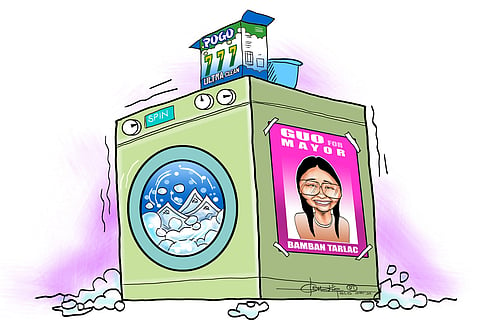
- NEWS
- the EDIT
- COMMENTARY
- BUSINESS
- LIFE
- SHOW
- ACTION
- GLOBAL GOALS
- SNAPS
- DYARYO TIRADA
- MORE

If the latest rose-colored prognosis by Moodys Investors Service is to be believed, the Philippines appears poised to exit the “gray list” of the Financial Action Task Force (FATF), a designation for nations with inadequate anti-money laundering (AML) controls.
This despite clear signs of a “high incidence” of money laundering, particularly within the gaming sector, thereby raising troubling questions about the effectiveness of the Philippines’ AML efforts.
Nothing better exemplifies this contradiction of the country exiting the FATF “gray list” and signs of rising money laundering than the case of Bamban Mayor Alice Guo, outside of suspicions she promptly denied of being a spy for China.
Guo’s alleged links to foreigners arrested in a Singaporean S$3-billion money laundering case, coupled with her unexplained wealth — a helicopter, a fleet of vehicles, luxury goods — had elicited calls for her suspension over alleged connections to criminal activities, specifically illegal offshore gaming.
While Guo denies any wrongdoing, the Senate probe brought forth her questionable background and unclear path to citizenship, raising red flags about lax identity verification processes that potentially allow individuals with dubious backgrounds to exploit the system.
The apparent ease with which Guo established and operated a company linked to criminal activities exposed weaknesses in corporate oversight and financial monitoring. Notwithstanding the Guo brouhaha, the Moodys report suggests the Philippines is making strides toward strengthening its AML framework.
Implementing stricter regulations, enhancing communication with financial institutions, and increasing investigations into suspicious activity all represent positive steps, as cited by Moodys. However, the apparent sheer volume of money laundering events, particularly within the gaming sector, suggests that Philippine AML efforts need to be significantly amplified.
First, putting in place robust enforcement mechanisms is crucial, with the investigation and prosecution of money launderers needing to go beyond the news and into the realm of actual convictions being scored by government prosecutors.
Second, stricter regulations and oversight within the gaming industry are essential. Authorities must identify and dismantle illegal operations while ensuring that legitimate businesses adhere to stringent AML protocols.
Third, the government must prioritize public-private collaboration. Financial institutions and businesses need to invest in building robust AML capabilities, including leveraging advanced technologies like AI and machine learning for enhanced customer due diligence and risk management.
The story of Mayor Guo is just one example, but it highlights several key vulnerabilities in the Philippines’ AML framework like porous borders and weak identity verification, corruption and political influence, and human trafficking and other cross-border crimes.
As an archipelago of over 7,000 islands, the Philippines struggles with borders that are so porous they hardly pose difficulty for individuals with criminal intentions to enter the country. Lax identity verification processes further exacerbate the problem, potentially allowing individuals like Guo to exploit the system and establish themselves as legitimate citizens and business owners.
Likewise, corruption remains a significant challenge in the Philippines, and it can impede effective AML implementation. Powerful individuals with vested interests in criminal activities may exert influence to undermine investigations and prosecutions. The lack of transparency around Guo’s meteoric rise to political prominence further fuels concerns about potential political influence in her case.
While it contributes to the economy, it also presents significant money laundering risks. The anonymity offered by online platforms and the potential for shell companies to be used to funnel illicit funds necessitate stricter regulations and robust monitoring mechanisms within the sector.
Money laundering is often intertwined with other criminal activities like human trafficking and cybercrime. As such, addressing money laundering effectively requires a holistic approach that tackles the underlying criminal activities it supports.
The Philippines’ potential exit from the FATF gray list is a positive development, but it should not be seen as an end goal. The country needs to continue strengthening its AML framework to effectively combat money laundering and protect its financial system by strengthening law enforcement, enhancing regulatory oversight, and promoting public awareness.
Raising public awareness about money laundering is crucial. Citizens need to understand the red flags associated with financial crimes and be empowered to report suspicious activity to the authorities. This can be achieved through public education campaigns, media engagement, and fostering a culture of integrity within society.
Also providing the edge in AML initiatives are advanced technologies like artificial intelligence (AI) and machine learning (ML) that can analyze vast amounts of financial data to identify suspicious patterns and transactions that might escape human detection.
Still, it’s important to remember that technology is only as effective as the people who use it. Human oversight and expertise remain essential for interpreting data and taking appropriate action.
